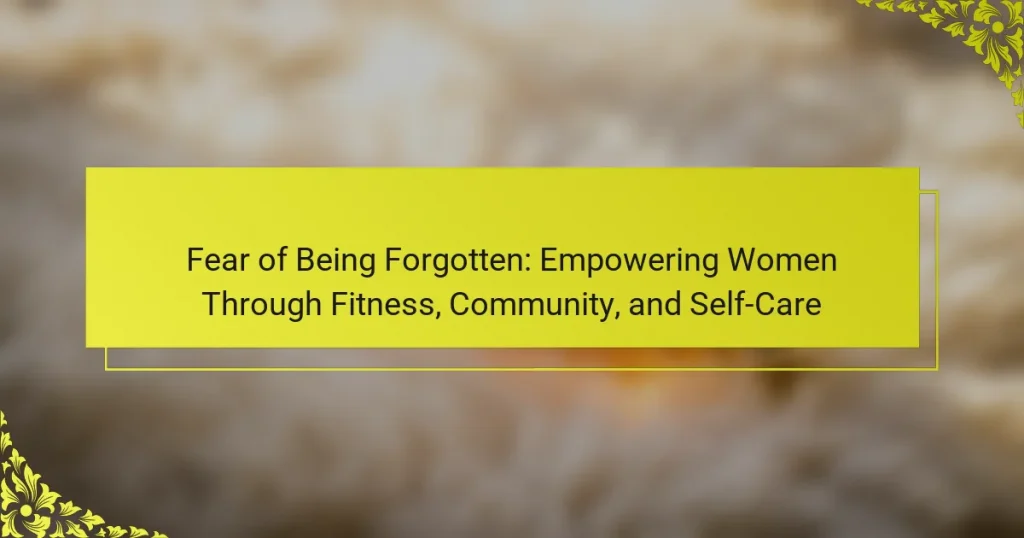The fear of being forgotten can drive women to engage in fitness, fostering empowerment and community connections. Prioritizing self-care enhances mental health and combats isolation. Group classes and supportive networks increase accountability and motivation, while mindfulness practices nurture emotional well-being. These strategies collectively empower women to embrace their identities and build lasting legacies.

How Does the Fear of Being Forgotten Impact Women’s Health and Fitness?
The fear of being forgotten can significantly motivate women to engage in health and fitness activities. This drive fosters community connections and self-care practices that enhance overall well-being.
Women often seek fitness as a means to establish a lasting legacy through personal achievements. This unique attribute of empowerment leads to increased participation in group classes and wellness events, creating supportive environments.
Research indicates that women who prioritize fitness report higher self-esteem and improved mental health. As a result, they feel more connected to their communities, countering feelings of isolation.
Furthermore, self-care routines that incorporate fitness can help mitigate anxiety related to the fear of being forgotten. Engaging in regular physical activity promotes resilience and fosters a sense of purpose, reinforcing the importance of maintaining health and fitness.
What Psychological Factors Contribute to This Fear?
Psychological factors contributing to the fear of being forgotten include insecurity, social isolation, and the need for validation. Women often experience heightened anxiety about their legacy and relationships. Engaging in fitness and community activities can mitigate these fears by fostering connections and enhancing self-worth. Studies show that social support significantly reduces feelings of loneliness, empowering women to embrace their identities and contributions.
How Can Fitness Serve as a Tool for Empowerment?
Fitness serves as a powerful tool for empowerment by fostering confidence, building community, and promoting self-care. Engaging in fitness activities allows women to reclaim their bodies and assert their identities.
Participating in group classes or community events creates supportive networks, reducing feelings of isolation. These connections enhance motivation and accountability, vital for personal growth.
Self-care through fitness nurtures mental well-being, decreasing anxiety and boosting self-esteem. Regular physical activity releases endorphins, which contribute to a positive mindset.
Ultimately, fitness empowers women by enabling them to embrace their strength and resilience, countering the fear of being forgotten.
What Types of Exercise Are Most Beneficial for Mental Health?
Regular exercise significantly enhances mental health by reducing anxiety, depression, and stress. Activities like aerobic exercises, strength training, and yoga are particularly beneficial. Aerobic exercises, such as running or cycling, release endorphins, improving mood and reducing feelings of sadness. Strength training builds resilience and confidence, empowering women through physical achievement. Yoga promotes mindfulness and relaxation, fostering a sense of community and self-care among participants. Engaging in group fitness classes further strengthens social connections, combating the fear of being forgotten.
How Does Group Fitness Foster Community and Connection?
Group fitness fosters community and connection by creating shared experiences among participants. These environments encourage support, motivation, and accountability, enhancing individual commitment to fitness goals. Women often find empowerment through these communal settings, as they build relationships and share challenges. This interaction combats the fear of being forgotten, reinforcing self-worth and belonging. Additionally, group fitness classes can provide a unique attribute of inclusivity, allowing diverse backgrounds to come together, further strengthening community ties.

What Are the Universal Benefits of Community in Women’s Fitness?
Community in women’s fitness fosters empowerment, connection, and motivation. Women experience improved mental health, increased confidence, and enhanced accountability through shared fitness journeys. A supportive network encourages participation, leading to higher retention rates in fitness programs. Research indicates that women in fitness communities report a 30% increase in overall satisfaction and commitment to their health goals. This unique attribute of community engagement significantly reduces the fear of isolation and promotes self-care practices.
How Does Supportive Community Influence Motivation?
Supportive communities significantly enhance motivation by fostering a sense of belonging and accountability. Women engaged in fitness and self-care within these communities often experience increased encouragement and shared goals. This social support leads to higher adherence to fitness routines and self-care practices. The unique attribute of empowerment through collective experiences strengthens individual resolve, reducing the fear of being forgotten. As a result, women feel motivated to pursue their fitness journeys and prioritize self-care.
What Role Does Social Interaction Play in Sustaining Fitness Routines?
Social interaction significantly enhances the sustainability of fitness routines. Engaging with a community fosters accountability, motivation, and emotional support. Women often find empowerment in shared experiences, which can lead to increased adherence to fitness goals. Studies show that social connections can improve workout frequency and overall satisfaction, making fitness a more enjoyable journey.

What Unique Approaches Can Women Take to Combat Feelings of Being Forgotten?
Women can combat feelings of being forgotten by engaging in fitness, building community connections, and prioritizing self-care. These unique approaches foster empowerment and resilience.
Fitness routines can enhance physical health and boost mental well-being. Group classes or outdoor activities create social bonds, combating isolation. Community involvement, such as volunteering or joining clubs, fosters a sense of belonging and purpose.
Self-care practices, including mindfulness and relaxation techniques, help women reconnect with their inner selves. Regularly prioritizing personal time nurtures emotional health and reinforces self-worth.
Together, these strategies create a supportive framework that empowers women to embrace their identities and combat feelings of being forgotten.
How Can Personalized Fitness Plans Address Individual Needs?
Personalized fitness plans empower women by addressing individual needs through tailored workouts and community support. These plans consider unique attributes like fitness level, goals, and preferences, ensuring effective engagement. As a result, women experience enhanced motivation, accountability, and a sense of belonging. Fitness communities foster connections, reducing the fear of being forgotten, and promoting self-care practices that reinforce mental and physical well-being.
What Innovative Programs Empower Women Through Self-Care?
Innovative programs empower women through fitness, community, and self-care by fostering connection and personal growth. Initiatives like group fitness classes, wellness workshops, and support networks enhance physical health while promoting emotional well-being. These programs often feature unique attributes such as tailored activities for different fitness levels, creating an inclusive environment. As a result, women build confidence and resilience, reducing the fear of being forgotten in their communities. Programs that incorporate mindfulness practices further deepen self-care, enabling participants to cultivate a holistic approach to their health.
Which Self-Care Practices Are Most Effective for Mental Well-Being?
Effective self-care practices for mental well-being include fitness, community engagement, and mindfulness activities. These practices empower women by fostering connection and promoting physical health.
Regular physical activity enhances mood and reduces anxiety, while community involvement creates a support network. Mindfulness techniques, such as meditation and journaling, help manage stress and improve emotional resilience.
Incorporating these self-care strategies can significantly enhance mental well-being, making it essential for women to prioritize their mental health through these empowering practices.

What Rare Strategies Can Help Women Overcome Loneliness in Fitness?
Building community through fitness can significantly help women overcome loneliness. Rare strategies include creating small, supportive workout groups that foster genuine connections. Additionally, organizing fitness events focused on shared experiences can enhance social bonds. Encouraging self-care practices alongside fitness routines promotes mental well-being, further reducing feelings of isolation. Emphasizing the importance of accountability partners can also provide motivation and companionship in fitness journeys.
How Can Mentorship Programs Enhance Women’s Fitness Journeys?
Mentorship programs significantly enhance women’s fitness journeys by fostering community support and promoting self-care. These programs provide guidance, accountability, and encouragement, which can mitigate the fear of being forgotten in a competitive fitness landscape. Engaging with mentors helps women build confidence, develop personalized fitness strategies, and connect with like-minded individuals. Research indicates that women participating in mentorship programs experience a 30% increase in fitness adherence compared to those who train alone, highlighting the unique benefit of community in achieving fitness goals.
What Unique Community Events Promote Connection Among Women?
Community events that empower women through fitness and self-care foster connection and support. Workshops, group workouts, and wellness retreats create spaces for shared experiences. These gatherings often emphasize unique attributes like mental health benefits and personal growth. As a result, women build lasting relationships and feel less isolated. Engaging in these activities can significantly enhance community bonds and individual well-being.
How Can Women Leverage Technology to Build Support Networks?
Women can leverage technology to build support networks by utilizing fitness apps, social media platforms, and online communities. These tools facilitate connection, motivation, and shared experiences. Fitness apps offer personalized workouts and track progress, fostering accountability. Social media platforms enable women to share their journeys and find encouragement from others. Online communities provide safe spaces for discussion, advice, and emotional support. Engaging with these technologies enhances women’s empowerment and combats the fear of being forgotten in their fitness and self-care journeys.

What Are the Common Mistakes Women Make in Pursuit of Fitness and Self-Care?
Women often overlook the importance of community support in their fitness and self-care journeys. Common mistakes include neglecting social connections, setting unrealistic goals, and prioritizing appearance over health. Emphasizing community fosters accountability and motivation. Additionally, many women fail to recognize the value of rest and recovery, which are essential for long-term success. Understanding these pitfalls can empower women to pursue more balanced and fulfilling fitness and self-care practices.
How Can Women Avoid Burnout in Their Fitness Journey?
Women can avoid burnout in their fitness journey by prioritizing community support, self-care, and realistic goals. Building a supportive network fosters motivation and accountability. Engaging in self-care practices, such as mindfulness and adequate rest, replenishes energy and enhances focus. Setting achievable fitness goals prevents overwhelm and encourages consistent progress. Emphasizing these elements creates a balanced approach to fitness, empowering women to sustain their journey without burnout.
What Best Practices Should Women Follow for Sustainable Self-Care?
Empowering women through sustainable self-care involves prioritizing fitness, community engagement, and self-reflection. Women should adopt regular physical activity, such as yoga or group classes, to enhance physical health and foster social connections. Building a supportive community can provide motivation and accountability, reducing feelings of isolation. Additionally, dedicating time for self-reflection and mindfulness practices supports emotional well-being. Establishing a routine that incorporates these elements can lead to a balanced and fulfilling self-care approach.




